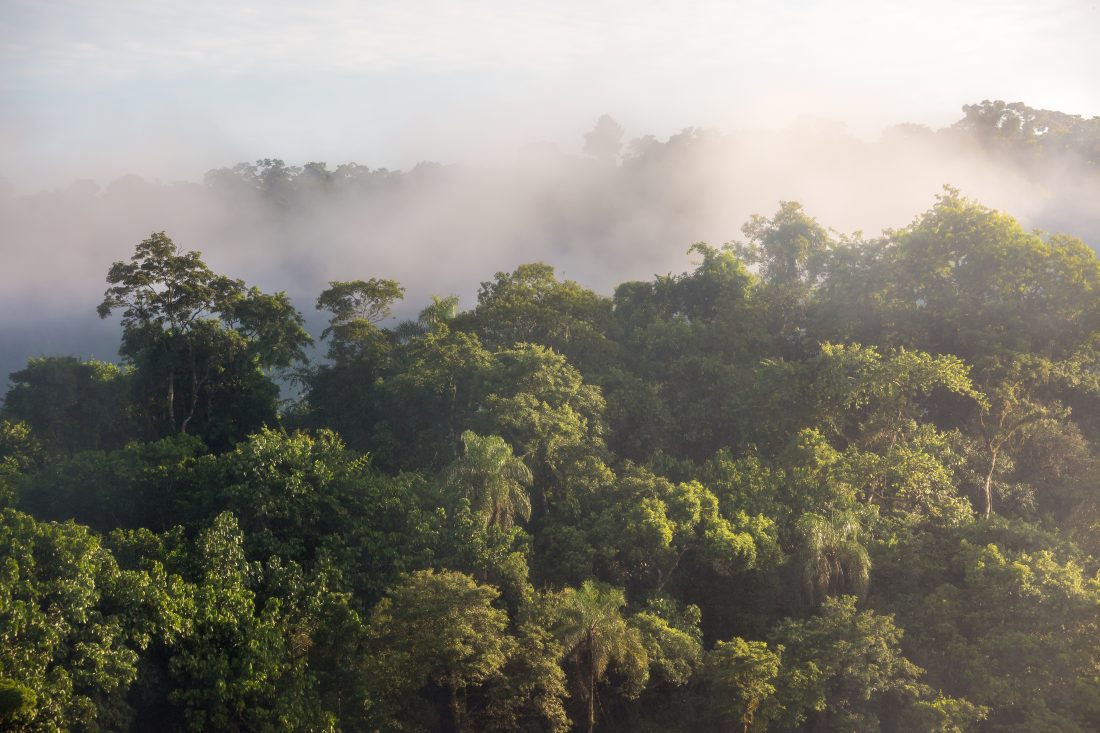Research by Awasi Iguazu Guide, Coti Mainero
The palm tree (Euterpe edulis) is endemic to the Atlantic Rainforest, and is protected by a special law, the Natural Monument that limits the use of the plant.
This tree grows in the dappled light of the undergrowth for about 15 years before reaching 20 meters in height.
Sadly, numbers are reducing as it is intensely sought out by poachers who want to sell a hyper nutritious food inside the palm tree: the palm heart.
Extracting this cylindrical and whitish bud involves cutting the entire palm tree, and in Misiones Province it is prohibited (it should be noted that the palm heart found in supermarkets comes from another species).

Rural scenes in Northern Argentina, a tractor and a palm tree behind
Protected Palm
Protecting the Palm Tree is fundamental as it is a main source of food for toucans and turkeys which fly over the northern border of the Iguazú National Park.
It has a cluster of small violet berries that ripen before the cooler winter weather, and are an important food source for these large birds.
Some species rely on these berries as their main food, meaning the Palm Tree has great ecological importance.

Toco-toucan found around the Iguazu Falls
The palm tree produces a delicious pulp that in effect protects the tree: it can be extracted without harm and demand for the pulp means there is a need for supply.
The importance of responsible consumption of local species and the preservation of biodiversity is central to Relais & Châteaux and a key part of their commitments to sustainability.
“It is about sustainable cultivation and consumption methods,” says Chef Mauro Colagreco, vice-president of Relais & Châteaux and UNESCO Goodwill Ambassador for biodiversity. “We are convinced that we can all have a real impact on our ecosystems through our consumption practices and our choices when it comes to food.”

Taking such orders at Awasi Iguazu, Argentina
Awasi Iguazu’s Chef Mauricio Alvez has started using palm tree pulp in the Relais & Chateaux restaurant, allowing Awasi guests to try flavours from the jungle.
The intense violet pulp is perfect for making desserts, ice cream, cakes and even signature cocktails.
“We use the palm heart pulp in marinades for meat,” says Awasi Iguazu Chef Alvez, “especially pork which we prepare with palm tree pulp, garlic, coriander, rosemary, olive, sugar, salt and let the pork marinade and then cook on the grill over coals”.

Local Producers
In the northernmost part of the Argentine northeast, you can find a sustainable project called Sabores de la Selva that was founded in 2020.
Whilst the pandemic paralysed life around the world, a new idea dawned on the team at Sabores de la Selva: why not use the fruit of the Palmito (palm heart) in a sustainable way to produce a pulp that can be used in gastronomy.
The idea was to create a high-end product that would compete with the famous Aca-i from neighbouring Brazil.
Extracting the pulp of the fruits of the Palmito had never been done before. They had to start from scratch.

A Sustainable Product
The team at Sabores de la Selva produce a pulp that is 100% natural, without preservatives or additives.
In addition, the company raises awareness among local producers of the importance of protecting palm trees by showing that it can generate profit.
This area was the centre of the logging and yerba mate industry in the 1970s after the provincial government gave large areas of native forest to immigrant families to populate an area that was at risk of coming into conflict with neighbouring Brazil.

A truck transporting mate leaves
“Green space is shrinking,” said Myrna, founder of Sabores de la Selva. “In addition to droughts, extensive yerba mate production affects the availability of fruits in the forest.”
This family-run company continues to diversify, adding new sustainable, local products, for example meliponas honey or yatei bees: a species of tiny native bees that have no sting.
Although their harvest is every two years, they are gradually adding more hives.

Awasi protects 145 hectares of virgin forest in the Atlantic Rainforest near the Iguazu National Park.
Each step towards sustainable production helps protect the valuable remainder of the Atlantic Forest.
For the Palm Tree to grow the forest needs to be conserved and protected, thus creating a virtuous circle in which the forest, its native fauna and flora are all protected.
Awasi lodges are carbon neutral, and the team at Awasi Iguazu is committed to co-existing with nature and protecting the surrounding area, the most biodiverse part of Argentina.

